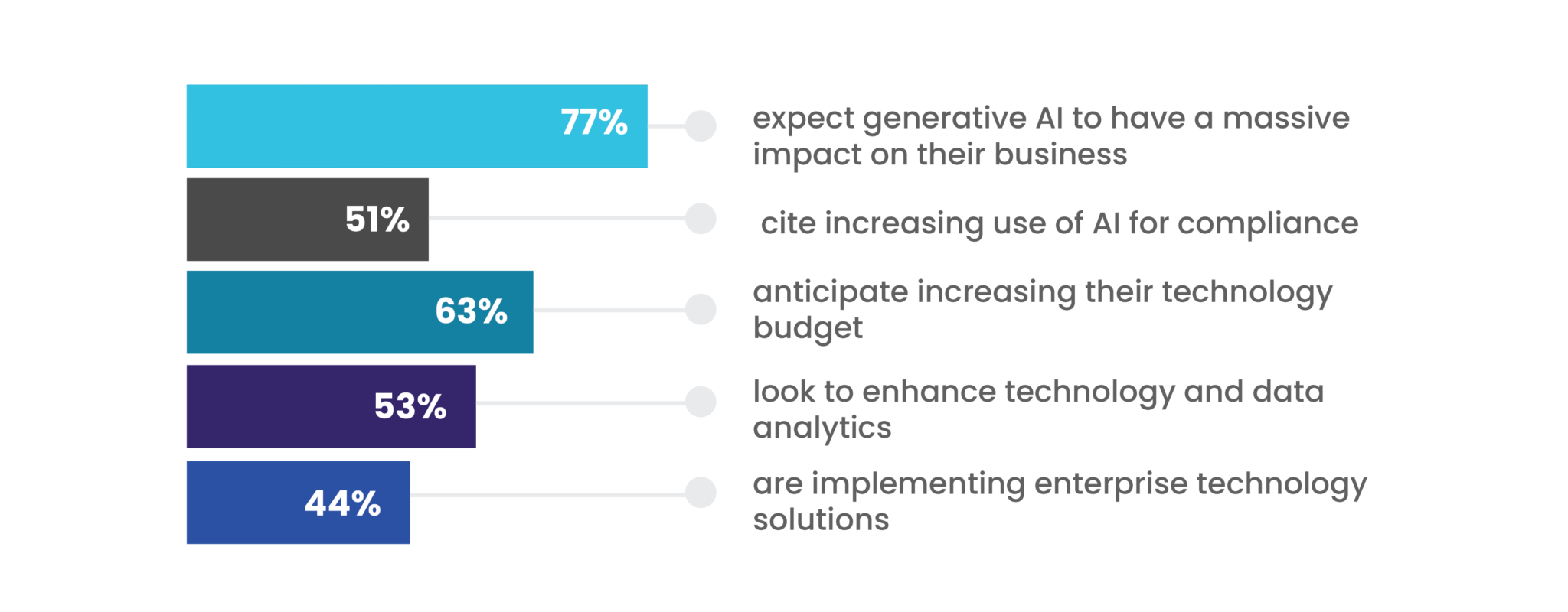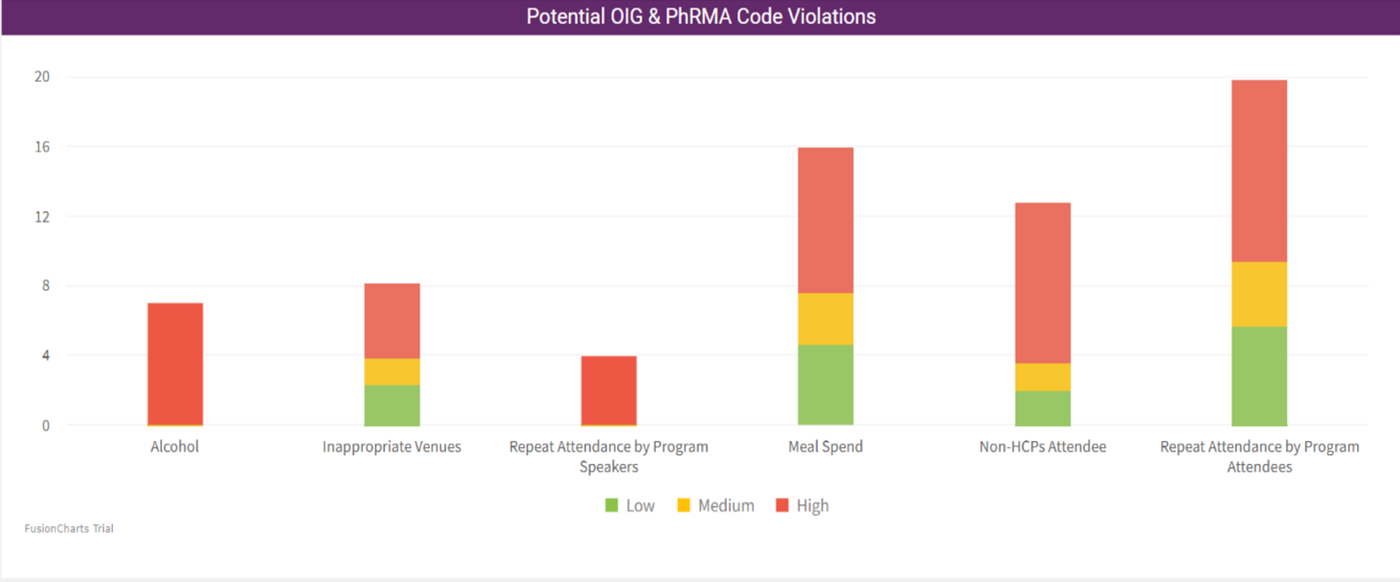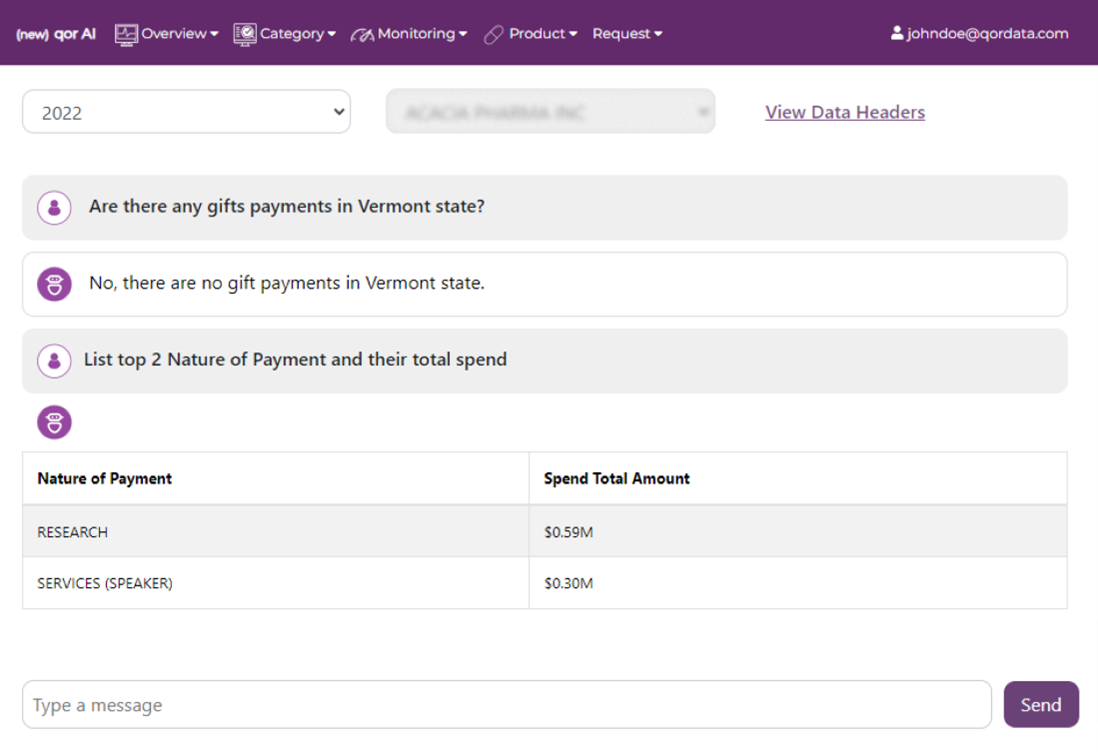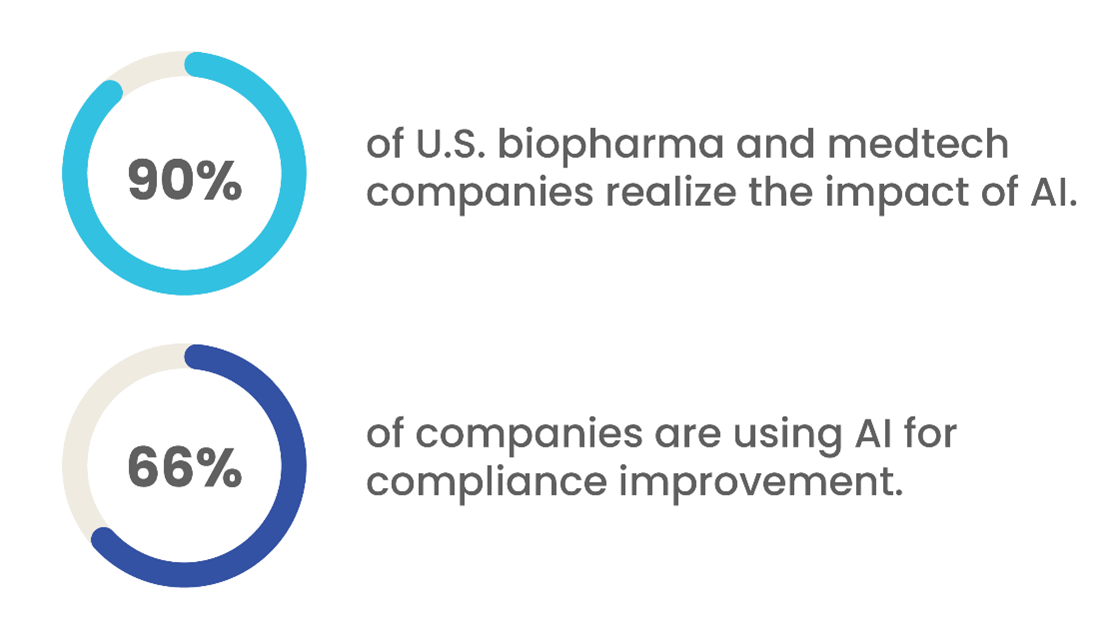Table of Contents
ToggleThe life sciences industry is subject to stringent regulatory requirements and constant scrutiny, making compliance a critical yet challenging aspect of operations.
Traditional methods of compliance management, often characterized by manual processes and retrospective audits, are no longer sufficient to keep pace with the dynamic regulatory environment.
To overcome such challenges, the integration of Artificial Intelligence (AI) in commercial compliance operations has emerged as a transformative force that enhances commercial compliance operations. It allows compliance officers and life sciences companies to effectively and efficiently identify, manage, and mitigate risks.
This is one of the reasons why compliance officers are focusing on utilizing such technologies to create dynamic and continuously improving compliance programs.
This article delves into how AI-driven solutions can enhance commercial compliance operations, offering insights into the role of AI in various commercial compliance operations, its impact on compliance programs, advantages, and more.
Understanding the Role of AI in Compliance
AI’s ability to analyze large volumes of data, identify patterns, automate tasks, and more makes it an indispensable tool for organizations that they can leverage to meet applicable rules and regulations.
According to a survey, CCOs are looking to increase their technology budgets in the following areas: 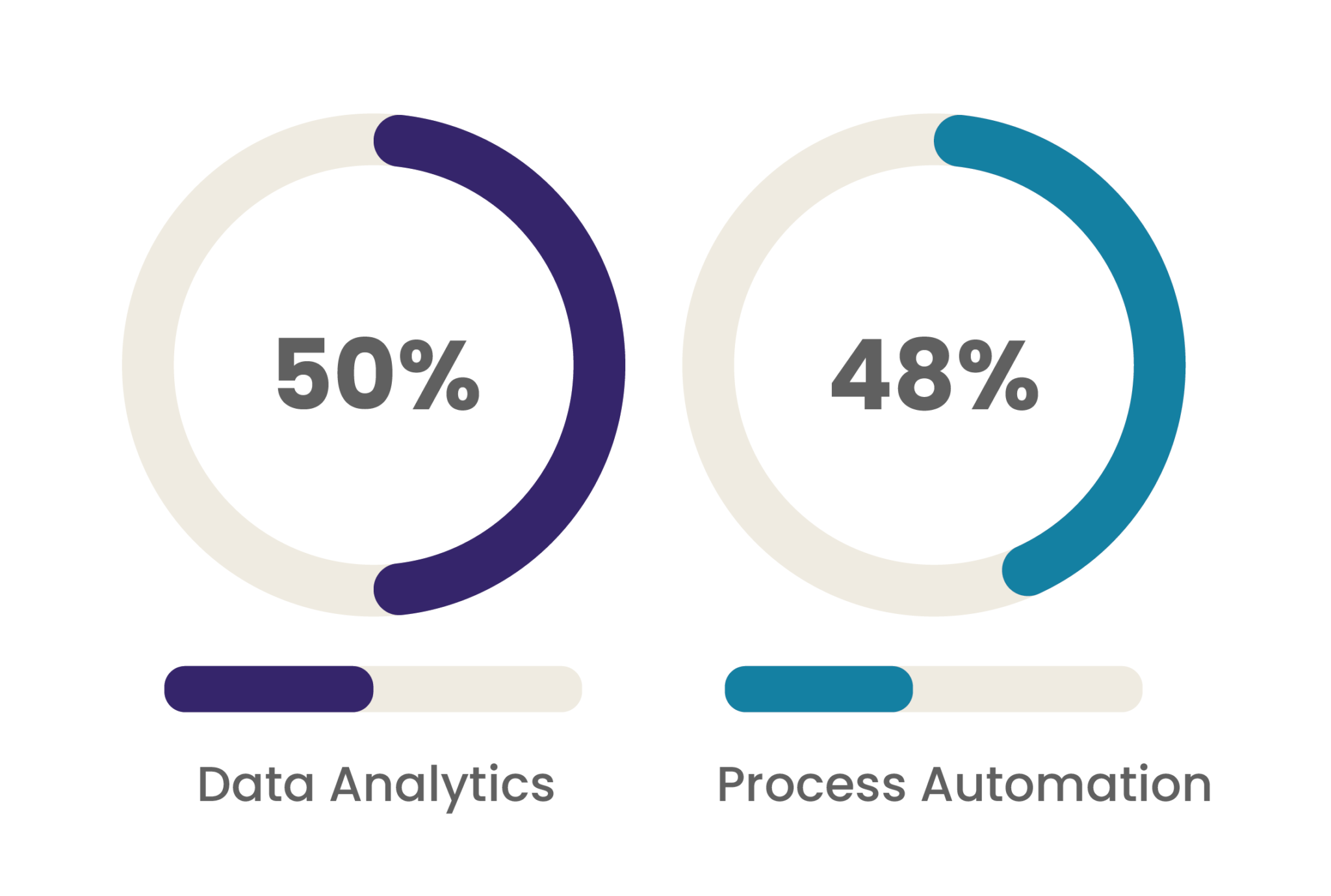
Moreover, by automating and enhancing data processing capabilities, AI significantly reduces the burden on compliance officers, allowing them to focus on strategic tasks and effective risk management.
AI also excels in predictive analytics, which enables organizations to foresee potential compliance risks before they manifest. This proactive approach allows companies to implement preventive measures and mitigate risks more effectively.
Here are other critical applications of AI in commercial compliance:
AI in Commercial Compliance
Leveraging AI for compliance can yield groundbreaking results for life sciences companies. The synergy of AI technology with compliance programs results in innovation, allowing compliance teams to mitigate emerging risks and keep up with changing regulatory demands.
AI can help the senior leadership and compliance officers to ensure active focus on evaluating, integrating, and automating key metrics to identify and highlight insights into the organization’s compliance efforts.
Additionally, specific aspects of AI such as Machine Learning, Computer Vision, Generative AI, and Data Sciences enable compliance officers to take the complexity out of compliance.
It can provide a holistic view of all the risks that exist across the organization, ensure quick risk remediation, and offer complete coverage of the seven elements of an effective compliance program.
See how qordata’s data-driven compliance platform assures that your compliance program is well-designed and effective
1. AI-Powered Expense Monitoring & Auditing
Detecting potential instances of fraud or misconduct by analyzing an organization’s expense data is considered one of the most effective ways to pinpoint suspicious activities or behaviors.
AI helps organizations to conduct a 100% audit of their expense data within a few minutes.
Machine learning (ML) algorithms can be trained to identify patterns and anomalies in expense data.
They can flag unusual spending patterns, duplicate expenses, and deviations from established policies, guidelines, or thresholds, saving compliance officers hours of manual and resource-intensive work.
ML can also detect inconsistencies in signatures, text, or formatting that may indicate the use of correction fluid, white-outs, and incompleteness, enabling compliance officers to focus their attention on high-risk transactions.
Such proactive auditing and monitoring of expense data allows swift identification risks such as outliers, fraud, unauthorized expenses, or inflated invoices, enabling compliance teams to take a more robust and effective approach to compliance.
Our Expense Monitoring & Auditing Solution leverages AI to conduct 100% audits of expense reports within a few minutes
2. AI-Driven Risk-Based Scoring
Leveraging Data Science and Machine Learning, compliance officers can calculate and refine aggregate risk scores of entities such as physicians, speaker events, and sales representatives by analyzing various engagement activities. This simplifies the selection of events for monitoring activities, both current and future.
AI can also enable compliance officers to detect non-compliant activities, such as non-conducive venues and repeat attendance by program attendees. In case non-compliance is identified, compliance officers can initiate investigation and remediation activities.
This capability is crucial for adhering to regulatory demands highlighted in the PhRMA Code, OIG Special Fraud Alert, and the U.S. Department of Justice (DOJ).
3. Generative AI for Data Analysis
Similar to ChatGPT, chatbots powered by generative AI enable compliance officers to actually “talk” to data like the CMS Open Payments published data.
This involves gaining actionable insights into spending, payment trends, and specialties, and more accessible and seamless for compliance officers. They simply have to ask questions and get responses quickly.
Moreover, the approach applies to both the publicly available data and the company’s internal data. AI can also analyze your company’s data and provide textual, tabular, and even custom dashboards.
This provides a comprehensive overview of key metrics to compliance teams and the capability to drill down into specific data points for detailed analysis.
Sign up for qordata’s CMS Genie, a solution that leverages AI to enable you to chat with CMS Open Payments data
The Impact of AI on Compliance Programs
Companies leveraging AI can significantly reduce the time required for compliance-related tasks, and improve accuracy, allowing compliance officers to redirect their efforts toward more strategic activities.
AI facilitates enhanced collaboration between different departments by ensuring that compliance data is easily accessible and interpretable, fostering a more integrated approach to regulatory adherence.
Moreover, AI-driven analytics provide a deeper understanding of compliance trends and potential risks, enabling organizations to anticipate issues and address them proactively.
AI’s potential to revolutionize compliance programs paves the way for more advanced and sophisticated compliance operations in the future, particularly ones that assure regulatory adherence with greater precision and speed.
Advantages of AI Adoption for Life Sciences Compliance
Adopting Artificial Intelligence in compliance brings numerous benefits while presenting specific challenges. Understanding and navigating these dual aspects is crucial for organizations as they integrate AI into their compliance functions.
1. Enhanced Efficiency & Accuracy
AI significantly speeds up regulatory data processing and analysis, ensuring efficiency and accuracy – a core component of compliance tasks. This rapid processing and AI’s ability to minimize human error led to more accurate compliance reporting and decision-making.
2. Proactive Risk Identification & Remediation
AI enables proactive risk identification and remediation. It allows compliance officers to identify emerging risks and vulnerabilities, enabling the implementation of targeted mitigation strategies to prevent compliance breaches before they occur. This reduces the likelihood of regulatory penalties or reputational damage.
3. Improved Decision Making
With AI’s comprehensive data analysis capabilities, compliance officers can make more informed decisions. AI provides deep insights that might not be evident through manual analysis, leading to better compliance strategies and more effective regulatory adherence.
4. Cost Reduction
AI can lead to cost savings in compliance operations over time. By automating routine tasks, reducing the need for manual oversight, and improving accuracy, organizations can reduce operational costs related to compliance, making compliance programs more sustainable and efficient.
5. Predictive Analytics
AI’s predictive analytics capabilities allow organizations to anticipate potential compliance risks before they materialize. By analyzing trends and patterns in data, AI can identify areas of concern, enabling proactive rather than reactive risk management, thus enhancing overall compliance effectiveness.
The Future of AI in Compliance
As regulatory environments evolve, AI’s role in compliance becomes more prominent and sophisticated. The future of AI in compliance points towards a more integrated, intelligent, and proactive approach.
1. Predictive Compliance
AI’s future in compliance will likely be defined by its predictive capabilities. AI systems will not only identify existing compliance issues but also predict future risks, enabling compliance officers to enhance the maturity level of their compliance programs from reactive to proactive.
2. Real-Time Compliance Monitoring
With advancements in AI, real-time monitoring of compliance will become more prevalent. AI systems will continuously analyze transactions, communications, and other business activities to ensure adherence to regulatory requirements, enabling compliance officers to respond immediately to potential compliance breaches.
3. Personalized Compliance Approach
AI is expected to offer a more personalized compliance approach tailored to the organization’s specific needs. By analyzing an organization’s unique risk profile and compliance history, AI can provide customized recommendations and strategies for compliance management, making compliance programs more effective and adaptive.
4. Improved Regulatory Intelligence
AI will automatically gather and process regulatory information from various sources, helping organizations understand current regulations, forecast future regulatory trends and changes, and prepare in advance. This capability will enhance the ability of compliance officers to stay informed and effectively meet regulatory demands.
How Can qordata Help?
qordata’s Data-Driven Compliance Platform leverages Artificial Intelligence such as Computer Vision, OCR, Machine Learning, Data Sciences, and Generative AI to solve life sciences compliance challenges through technology.
It empowers life sciences compliance teams to get a holistic view of all the risks that exist across the organization and offers coverage of the seven elements of an effective compliance program while adapting seamlessly to your existing processes.
Summary
The future of AI in compliance is poised for substantial growth and sophistication. It promises increased efficiency, accuracy, and proactive risk management.
The synergy between AI and human expertise will redefine the landscape of compliance management, offering a more robust, efficient, and adaptive approach to meeting regulatory requirements.
As life sciences companies continue to navigate the complex regulatory landscape, AI-driven solutions will be integral to ensuring compliance and driving innovation in the industry.

